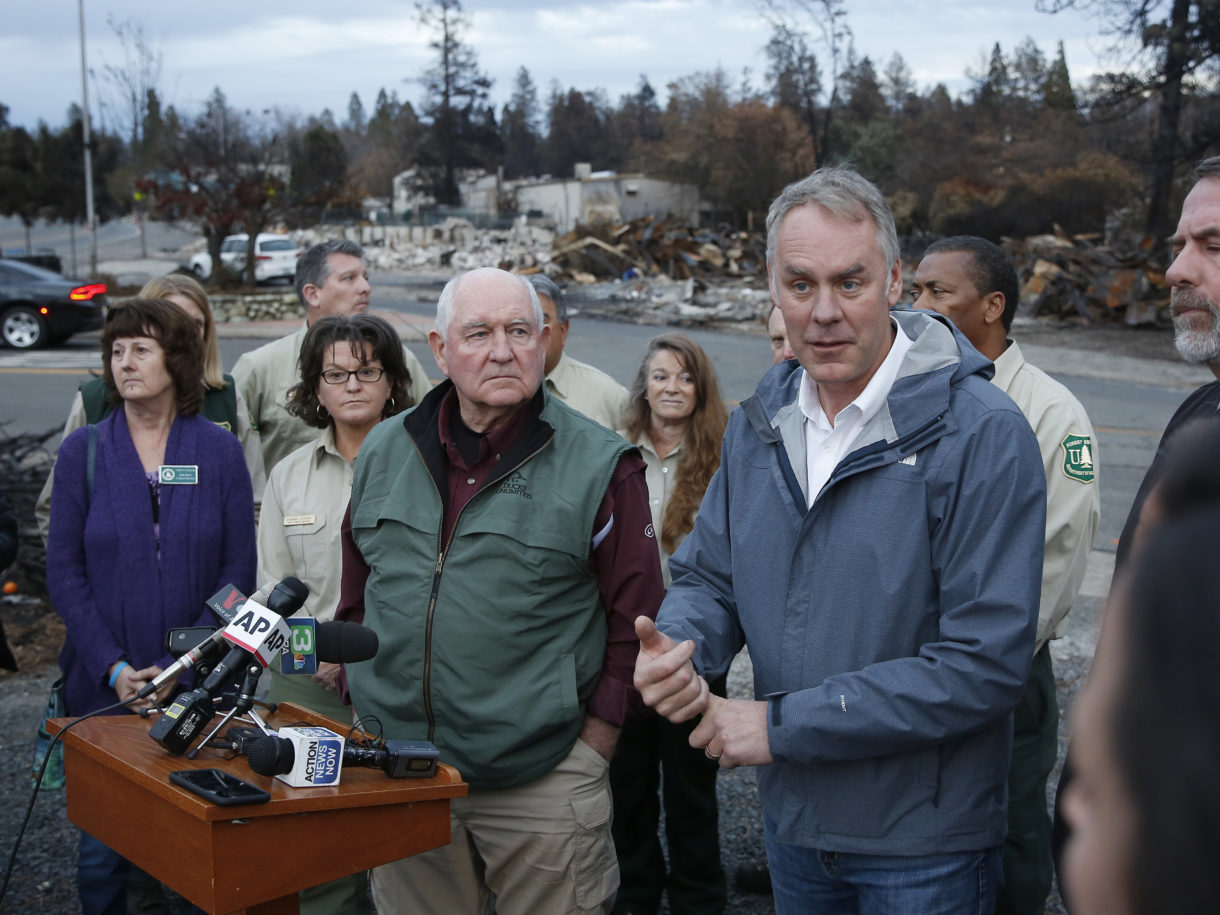It’s looking like the House and Senate could be finally coming to agreement on the sweeping Farm Bill. One of the latest big sticking points has been a provision that would limit public review and environmental analysis of forest projects on federal public land.
The Trump administration is pushing this in the wake of the deadly wildfires in California. In his second visit to Paradise, Calif., in as many weeks, Interior Secretary Ryan Zinke said on Monday that some of the disaster could have been mitigated if there had been more active forest management.
“When we looked at areas up there that had been treated for fire, thinned, those were the lines of defense that the firefighters were using,” Zinke said, in an interview with KCRA-TV in Sacramento.
Wildfire scientists will study that question for years: Would more thinning of dense stands of trees on federal forest land have made a difference when the Camp Fire roared onto private land and into Paradise? But in an op-ed for CNN, Zinke said more active forest management — from thinning to prescribed burns — needs to happen now.
He urged swift passage of the Farm Bill, which includes House-backed amendments mandating a controversial expansion of “categorical exclusions,” which allow land managers to fast track forest management projects and largely bypass environmental review.
Agriculture Secretary Sonny Perdue, who oversees the U.S. Forest Service, indicated his support of those provisions on Morning Edition last week. “Heretofore we’ve really been litigated into paralysis about being able to do the common sense thinning and underbrush cleaning that needs to happen to prevent these amazing, awesome forest fires,” Perdue said.
According to the government’s own analysis — the last done in 2010 during the Obama administration — less than one-fifth of all timber and forest projects are appealed by citizens or environmental groups. A far bigger hold up is bureaucracy, and budget cuts particularly at the USFS. It can now take hundreds of days just to get a single, non-controversial, forest project approved.
Greg Aplet, science director for the Wilderness Society in Denver, says the current Farm Bill does little to get more critical wildfire mitigation work going. But it does give expansive authority to political appointees like Zinke and Perdue to squash public input on huge forest management projects.
“We’ve seen it every time the woods catch on fire. Politicians use the genuine fear of fire, to dry to drive changes that undermine environmental laws,” Aplet says.
Aplet takes the view of many wildfire behavior scientists: If the goal is to protect communities and lives from fire, the emphasis first needs to be on clearing out those dried out, fine fuels, the understory, from the forest floor, not the green live trees.
“The kind of work that needs to be done is work that is not going to provide a lot of logs to the timber industry,” Aplet says.
Some timber mills in northern California in particular are being retrofitted to handle that smaller diameter wood that’s the greatest wildfire risk and turn it into commercially viable products. The industry has long been concerned about a sustainable market and supply for the small diameter trees on federal public land.
The Forest Service has been so focused on fighting wildfires in recent years, they’ve had to move away from more long term projects to restore the health of the forest.
“The Forest Service often lacks the personnel and the resources to do the types of landscape-scale restoration work that needs to be done,” says Nick Smith, executive director of Healthy Forests, Healthy Communities, a non-profit forestry group.
There’s been growing agreement in the West from timber companies to environmental groups that what’s really needed is that landscape level restoration — a more involved and expensive process than just making it easier to log again on public land.
This past spring, Congress did create a separate account for fighting fires which will protect some money already allocated for mitigation work. But it doesn’t take effect until late next year and, as Smith points out, it’s temporary.
So he supports the current farm bill, because it could get the work going quicker.
“The Farm Bill, at least the reforms we’re supporting, isn’t so much focused on supporting industry as it is in getting the Forest Service back to its core mission,” Smith says.
The Forest Service’s own studies show that 80 million acres of land it manages are at risk of major fires. So far only about two million acres have been treated.
